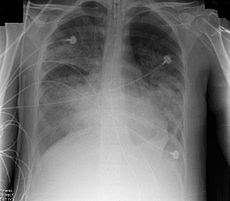Acute respiratory distress syndrome (ARDS) is a life-threatening lung condition that prevents enough oxygen from getting to the lungs and into the blood.
ARDS also known as respiratory distress syndrome (RDS) or adult respiratory distress syndrome is a serious reaction to various forms of injuries or acute infection to the lung.
It is characterized by inflammation of the lung parenchyma leading to impaired gas exchange with concomitant systemic release of inflammatory mediators causing inflammation, hypoxemia and frequently resulting in multiple organ failure.
ARDS can be caused by any major injury to the lung. Some common causes include:
- Breathing vomit into the lungs (aspiration)
- Inhaling chemicals
- Lung transplant
- Pneumonia
- Septic shock (infection throughout the body)
- Trauma
Symptoms
- Difficulty breathing
- Low blood pressure and organ failure
- Rapid breathing
- Shortness of breath
Symptoms usually develop within 24 to 48 hours of the injury or illness. Often, people with ARDS are so sick they cannot complain of symptoms.
There is no specific treatment for ARDS. A person with ARDS is treated in the intensive care unit at the hospital. Often a person with ARDS will need a machine's help to breathe (called mechanical ventilation) and oxygen therapy.
Treatments may include:
- Oxygen through tubes in your nose or through a mask
- Oxygen through a breathing tube. The tube is flexible and goes through your mouth or nose into your windpipe. The tube is connected to a ventilator, a machine that helps you breathe.
- Fluids through an IV line to improve your blood flow and to provide nutrition
- Medicine to prevent and treat infections and to relieve pain
Nanda Nursing Diagnosis for ARDS
1. Ineffective Airway Clearance
2. Ineffective Breathing Pattern
3. Impaired Gas Exchange
4. Decreased Cardiac Output
5. Risk for Injury
6. Excess Fluid Volume
7. Impaired Physical Mobility
8. Impaired Skin Integrity
9. Impaired Verbal Communication
10. Ineffective Coping
11. Sleep Pattern Disturbance






0 Comments